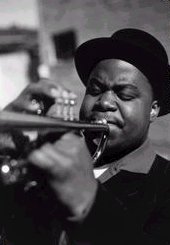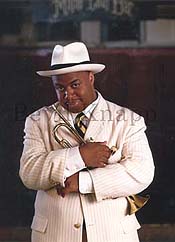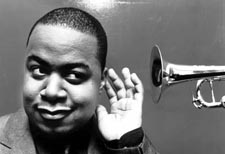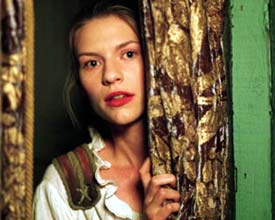 Nicholas Payton
Nicholas Payton
'Nick Payton: Playing Whilst Under The Influence!'
Sonic Trance is Nicholas Payton's seventh album and first for Warner Bros. Records. It features Payton along with two members from his previous quintet: Tim Warfield on tenor and soprano saxophones, and Adonis Rose on drums. Payton then recruited Kevin Hays on electric keyboards and piano, Vicente Archer on upright bass, Danny Sadownick on percussion and Karriem Riggins on sampler and synthesizer. They played live between September and December of 2002, then recorded over five heady days in January.
Nicholas Payton was born September 26, 1973, in New Orleans, Louisiana. His mother was an operatic singer and classical pianist. His father is a respected bassist and retired school teacher. A young Nicholas benefited from musicians coming to the house for rehearsals which his father allowed him to watch. He began gigging at eight years-old with his dad, eventually playing with the All-Star Brass Band, a traditional jazz youth group that played across the United States and abroad.
Payton later enrolled at the New Orleans Center for Creative Arts (where Sonic Trance also happens to have been mixed), then studied with Ellis Marsalis at the University of New Orleans. He went on to perform and record with some of the most respected giants of jazz, including Joe Henderson, Clark Terry, Jimmy Smith and Elvin Jones, who appointed him musical director of his renowned Jazz Machine at the age of nineteen.
 Catching up with the man himself, we first discussed why at the age of four, when his father was a bassist and his mother a pianist, he chose the trumpet?! ”Well, New Orleans is a trumpet town all the way back from Louis Armstrong, King Oliver and more recently Wynton Marsalis and Terence Blanchard. So, there’s been a long history of trumpeters who’ve come from this town. I was very much influenced with the musicians that my father would play with - especially the trumpeters. I think the instrument spoke to me the most out of all that were in my environment and I felt that it lent itself to my voice. I think when most musicians pick an instrument they pick something they feel they can be most expressive at and the trumpet was that instrument for me.”
Catching up with the man himself, we first discussed why at the age of four, when his father was a bassist and his mother a pianist, he chose the trumpet?! ”Well, New Orleans is a trumpet town all the way back from Louis Armstrong, King Oliver and more recently Wynton Marsalis and Terence Blanchard. So, there’s been a long history of trumpeters who’ve come from this town. I was very much influenced with the musicians that my father would play with - especially the trumpeters. I think the instrument spoke to me the most out of all that were in my environment and I felt that it lent itself to my voice. I think when most musicians pick an instrument they pick something they feel they can be most expressive at and the trumpet was that instrument for me.”
How did you feel at the age of 12 to already be playing in European Festivals? ”Well, my father always made it a point to include his family on a lot of his travels. As early as the age of three I remember going to Sweden and several times after going to Europe and various places with him. So by the time I started hitting the road on my own as a professional I’d already been all over the world. Playing music is something that I’ve always loved and to be able to travel and be able to share that with people, I can’t think of a greater joy really.”
 You studied with/under both Wynton and Ellis Marsalis, so what experience did you garner and what important lessons were taught you along the way? ”Well, Wynton is obviously one of the world’s greatest musicians and at the time I was coming up I think for many of us he represented that it was possible for a young man in today’s world to play Jazz music and to have a career. Specifically to me, he just spent so much time with me instilling so many different techniques in terms of how to play this music and how to address the trumpet. He turned me onto many things that I should listen to that would help me develop my vocabulary in order to be able to approach this music.”
You studied with/under both Wynton and Ellis Marsalis, so what experience did you garner and what important lessons were taught you along the way? ”Well, Wynton is obviously one of the world’s greatest musicians and at the time I was coming up I think for many of us he represented that it was possible for a young man in today’s world to play Jazz music and to have a career. Specifically to me, he just spent so much time with me instilling so many different techniques in terms of how to play this music and how to address the trumpet. He turned me onto many things that I should listen to that would help me develop my vocabulary in order to be able to approach this music.”
Why the title Sonic Trance for the new album? ”Sonic Trance, I think represents the mood that we want to put people in. ‘Sonic’ obviously representing the music and ‘Trance’ is sort of for the hypnotic state that we want people to get engaged in when we perform this music. We’ve tried to make it a point to get people into certain zones and once I get it happening I just don’t want to let it go.”
Describe your feelings when you created these songs:
’Velvet Handcuffs’ - ”’Velvet Handcuffs' is sort of a piece that is very much inspired by a lot of the atmospheric type of music of say Carl Heinz Stockhausen or Brian Eno where its music is in the notes and the tones. There’s a mood created but there’s nothing particularly stated that would be like a focal point. Like a melody. It’s more music that invokes a mood rather than being a tune.”
’Peeping Tim’ - ”That’s a sort of spontaneous creation in the studio. Tim [Warfield] started playing this theme and we all sort of interacted with that theme. It’s also a recurrent theme that appears on the melody which is back to the trance theme. The feeling that is created when the same note is repeated over and over again. That was something that I was very interested in exploring on this particular recording and that was just one of the incarnations.”
'Cannabis Leaf Rag 1' - ”The idea there was to explore the similarities of early ragtime music in the syncopation and also hip-hop. Basically the tune just developed from there.”
Where you at all worried about using the words ‘Cannabis Leaf’ in the title?! ”No, I thought it was funny and most people find humor in it,” he gently laughs.
It’s been stated that your new CD “goes beyond the realms of jazz”, but whats your thoughts? ”For me, I’ve come to shy away from this term Jazz. Particularly with describing what I do now. Because I think Jazz is a connotation of what has come to mean, in many ways to many people, an over-used term used to categorize things that I think are very un-Jazz like. So, I like to think of this more as spontaneous dialogue.”
Is this new sound one that first originated, perhaps, when you played in Time Machine? ”Oh sure, certainly that band was a workshop for many years for me to explore sonic explorations in this direction. But so was my acoustic quintet [Soul Patrol] that I had for years. I think many other experiences that I’ve had from working with other artists in the hip-hop and rock genre over the years has also, but I would say yes, Time Machine was a big part of it.”
 Your debut album From This Moment came out in 1995, but how have you changed as an artist in the ensuing eight years? ”Wow, I think more importantly, I think that it’s the changes that I’ve made as a person that have affected my music. I think as we grow and as we learn things about life and have different experiences, our music seems to reflect that. And I think, because of recent occurrences in my life such as a label change, getting married, the Nick@Night record that I made, and even years ago when I had a child, that the art reflects what we go through. And I think this represents that path in a more personal way more than my previous recordings. I think it was even more of an attempt to try to deal with that.”
Your debut album From This Moment came out in 1995, but how have you changed as an artist in the ensuing eight years? ”Wow, I think more importantly, I think that it’s the changes that I’ve made as a person that have affected my music. I think as we grow and as we learn things about life and have different experiences, our music seems to reflect that. And I think, because of recent occurrences in my life such as a label change, getting married, the Nick@Night record that I made, and even years ago when I had a child, that the art reflects what we go through. And I think this represents that path in a more personal way more than my previous recordings. I think it was even more of an attempt to try to deal with that.”
Finally, please describe your music in two or three words ”I like to refer to what we do as spontaneous dialogue.”
Interviewed by Russell A. Trunk
www.nicholaspayton.com
To win a Brand New copy of Nicholas' new CD, Sonic Trance just answer his very own question! "The song ’Cannabis Leaf Rag’ borrows a theme from an old ragtime piece? What is that piece of music?"
Now, just send an e:mail to me with the subject title 'NP' and the answer in the text to:
exclusivemagazine@flash.net
Back To Archives

